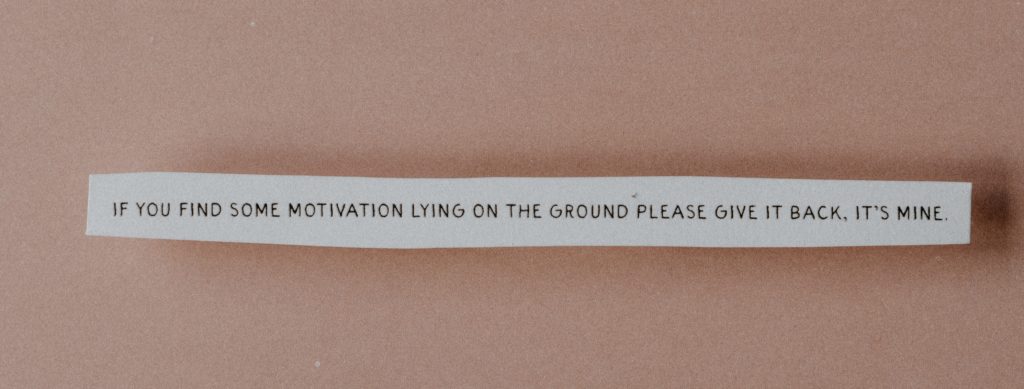By Yvonne Milosevic
Here at the Blacklight, we’ve shared strategies for improving your motivation a time or two. Today, we’re coming at this from a new angle: namely, that motivation is overrated. You read right—you can succeed even when you’re feeling utterly unenthusiastic. This isn’t to say you should abandon all attempts at finding that shot in the arm that gets you moving. But we hope to ease some of the anxiety that can lead to paralysis if your motivation has vaporized.
Professor Gráinne Fitzsimons of Duke University’s Fuqua School of Business studies motivation and has a refreshing take on the topic. “Rather than focusing on keeping ourselves psyched up, and bolstering our motivation, and putting little motivating sticky quotes on our screens, my real suggestion to you is to consider thinking of motivation as something that’s lovely, nice to have, a gift from the universe—but not necessary to do what it is that you want to do,” Fitzsimons says.

So, what to do instead when you don’t feel motivated? You have a few options. First, you could just get started on whatever you’re procrastinating about. Often, satisfaction sets in once you’re in the middle of the task or have completed it. Think of that feeling you get after a workout when you had to drag yourself to the gym, says Fitzsimons.
You could also try making yourself accountable to someone else. “If your mom is counting on you to come through with something, you’re more likely to come through,” Fitzsimons notes. “So those are the kinds of ways we can take advantage of motivation’s flightiness by sort of bolstering it.”
Or, you could try a complete shift of your mindset.

Motivation Adjacent
The best strategy might be to embrace this mantra: You don’t have to feel like getting something done to get something done. Oliver Burkeman makes the following observation in his book, “The Antidote: Happiness for People Who Can’t Stand Positive Thinking.”
“Who says you need to wait until you ‘feel like’ doing something in order to start doing it? The problem, from this perspective, isn’t that you don’t feel motivated; it’s that you imagine you need to feel motivated. If you can regard your thoughts and emotions about whatever you’re procrastinating on as passing weather, you’ll realise that your reluctance about working isn’t something that needs to be eradicated or transformed into positivity. You can coexist with it. You can note the procrastinatory feelings and act anyway.”
Finally, know that adopting routines and habits can often take motivation’s place. For example, commit to tackling your most challenging assignments before lunch each day. Eliminate digital distractions that sap your attention. If the task is boring or hard, try the Pomodoro technique and work in short, contained bursts. It takes time and effort to establish good habits. But once you do, you won’t need to feel like doing X task. You just do it.
“What if motivation is not a birthright, but a lovely reward from the universe that we can earn by doing things,” says Fitzsimons. “I think that framing of motivation is much more helpful than the one that has us sitting around and waiting for it to strike.”



